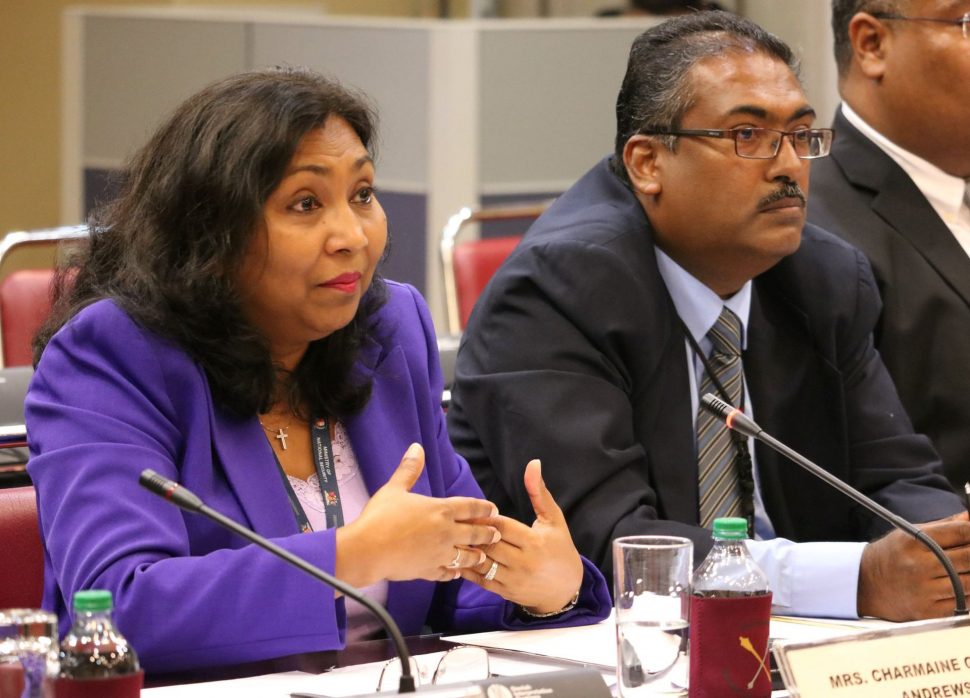(Trinidad Guardian) Nationals from Peru, Nicaragua, Guatemala and Colombia with a string of criminal records have been coming to Trinidad posing as Venezuelans.
The revelation was made before yesterday’s Joint Select Committee into Finance and Legal Affairs chaired by Sophia Chote, SC.
Appearing before the committee were officials of the Immigration Division and Vision of Mission.
The committee was told by Immigration Officer Geewan Harricoo that in 2016 2,000 foreign nationals were placed on orders of supervision by immigration while in 2017 the figure dropped to 1,600.
Last year, it was 2,000. As of this year, there was a record of 200 new nationals.
Such nationals are required to report to immigration.
“What you are finding, in most of the cases, is there is an almost 50 per cent breach of that order of supervision. When we check our border management systems they are in the country but they are not reporting to us. They are working without a work permit and studying without a student permit,” Harricoo said.
Some of these nationals, Harricoo said would be picked up following a police raid only for immigration to find out that they have “multiple criminal offences” which are committed in our shores.
Acting Chief Immigration Officer Charmaine Gandhi-Andrews said the electronic monitoring system can be useful to track such nationals, stating that some of the nationals had “left the country clandestinely.”
Vice chairman Clarence Rambharat said the order of supervision seemed problematic.
With 153 foreign nationals at the Immigration Detention Centre (IDC) of which 114 are Venezuelans, Rambharat said the cost to maintain a detainee was $8,000 a month.
“So if you had to detain all those persons from last year…the 2,000 and the 200 from January we are talking about $219 million a year. $18 million a month. So it is a significant cost,” Rambharat said hypothetically.
The minister wondered why non-custodial sentencing was not working and could help in reducing the cost.
A Nigerian, the committee was told has been at the IDC since January of 2015, others have been there a year.
Gandhi-Andrews said costs would always be an issue.
“We avoid putting them into prison. It is going to escalate. We find that more and more persons are coming into the country and breaching the terms and conditions of their landing certificate…remaining in the country illegally. More and more you see people entering the country without documentation. And that is providing a significant headache for us because there is nowhere to keep them,” she said.
She said immigration has been providing the foreigners with the orders because of lack of accommodation which has not been an ideal situation.
She said approximately 500 have breached the Immigration Act.
Chote said if there is no stay of execution or civil proceedings in court “nothing prevents you from deporting the person.”
She asked how immigration was dealing with the exodus from Venezuela asking if the 114 Venezuelans at the IDC had committed criminal offences and applied for refugee status.
Harricoo admitted that “100 per cent arrived by clandestine means.”
Among those who do not come through the legal ports of entry as well are children.
“And a significant amount, if not all, we cannot identify. They are coming to Trinidad without any documents. What we are finding they are not Venezuelans in some cases. They are posing as Venezuelans. They are a lot of nationalities that are coming to Trinidad posing as Venezuelans…Nicaraguans, Guatemalans, Colombians and even some from Peru. It takes a lot of effort and time to try and identify these people,” Harricoo said.
Harricoo also disclosed immigration has also discovered that “these persons also have significant criminal antecedents in their homeland and we get that through our partnership with the Interpol Bureau.”
He said the court ordered that three children be placed in the care of the Chief Immigration Officer and be repatriated immediately.
Gandhi-Andrews the children had to be placed at the IDC among adults.
Finding funds to repatriate the children, she said was another headache as her budget does not cater for this.
“Some of my officers in certain cases have actually put up money and bought a ticket,” she said.

